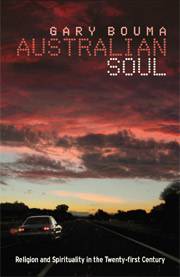Book contents
- Frontmatter
- Contents
- Tables and Figures
- Preface
- Acknowledgements
- 1 Introduction
- 2 Qualities of Australian religion and spirituality
- 3 Quantities of Australian religion and spirituality
- 4 Spirituality and cultural change
- 5 The changing social location of religion and spirituality
- 6 The mainstream: From Christendom to comfortable on the margins
- 7 Religion and spirituality respond to change
- 8 Religion, spirituality and Australian social policy
- 9 Signs of hope in the twenty-first century
- Further reading
- References
- Index
8 - Religion, spirituality and Australian social policy
Published online by Cambridge University Press: 05 June 2012
- Frontmatter
- Contents
- Tables and Figures
- Preface
- Acknowledgements
- 1 Introduction
- 2 Qualities of Australian religion and spirituality
- 3 Quantities of Australian religion and spirituality
- 4 Spirituality and cultural change
- 5 The changing social location of religion and spirituality
- 6 The mainstream: From Christendom to comfortable on the margins
- 7 Religion and spirituality respond to change
- 8 Religion, spirituality and Australian social policy
- 9 Signs of hope in the twenty-first century
- Further reading
- References
- Index
Summary
‘Social policy’ refers to efforts to control, organise or direct the shape and operation of a society designed to achieve particular ends usually seen to be making things better for the society and its people. The issues addressed by social policy, particularly in societies like Australia, include equity in the distribution of goods and services, fairness in employment, education and health policies, population size and composition policies, intergroup relations policies, multicultural policies, gender relations, family formation policies, inclusion and exclusion. Any dimension of social life can become subject to social policy. While governments exist in part to establish such policies, organisations also set internal policies about the relations of their members, hiring practices, bases for grievance procedures and privacy. Social policies reflect, either intentionally or accidentally, a society's ideals for itself.
The Australian Government has established social policies on discrimination in hiring, access and equity, privacy, funding for separate schools and a host of other areas. State and local governments usually follow suit, putting in place legislation to ensure that the policies have effect. In addition corporations, schools and universities, and other organisations establish their own policies and internal working procedures to implement policies. Policy without procedures to ensure that the policy is applied is ineffective. Policies and procedures often have the force of law or the backing of the state. Policy may be negative: trying to stop something, or positive: aimed at promoting something. Of course, deciding not to do something is also a policy.
- Type
- Chapter
- Information
- Australian SoulReligion and Spirituality in the 21st Century, pp. 172 - 203Publisher: Cambridge University PressPrint publication year: 2006



